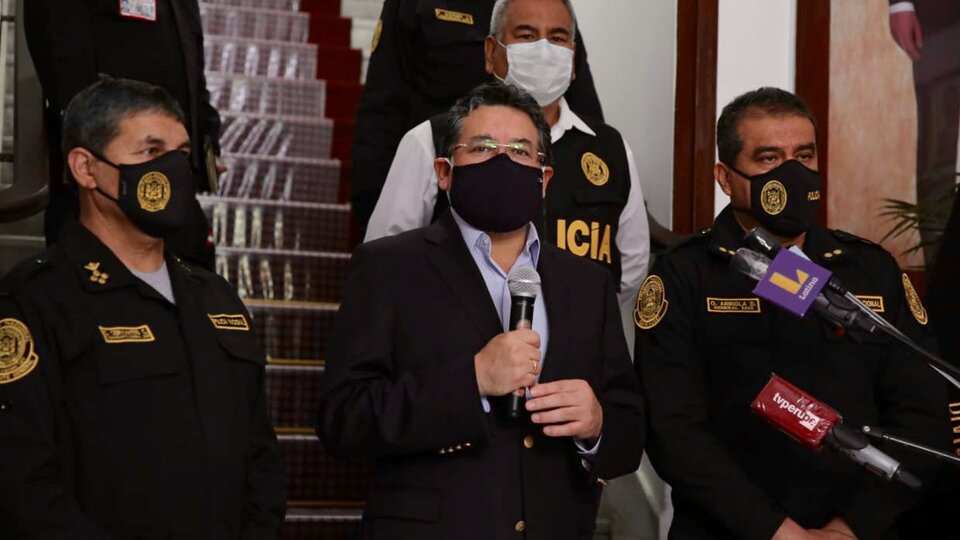
[ad_1]
From Lima. Barely two weeks after taking office, the President Francisco Sagasti – appointed by Congress until July 2021 when he will be replaced by the government elected in the April elections – faces his first fit. A crisis on two fronts: the political and the social. The ministers had just finished settling in their positions and Sagasti’s ministerial cabinet has already suffered its first victim. Interior Minister Rubén Vargas resigned after criticizing a police purge that retired eighteen generals. The president takes the hard blow of this resignation just three days after firmly defending his minister and the purging police. This cabinet crisis erupted for the new government when it faced its first social crisis with protests from farm workers demanding job improvements.
One of the first measures of the Sagasti government was to dismiss the entire police leadership. The government explained this decision due to the need to make changes in the police due to the brutal crackdown on massive protests in rejection of the parliamentary coup that removed Martín Vizcarra and put Manuel Merino in the presidency, which lasted less than a week and was replaced by Sagasti. The repression left two dead and around two hundred injured. Another reason given by the government for the purge of the police was the corruption of its leaders. Two compelling reasons to justify this decision, but from different sectors it has been questioned that the purge reached agents unrelated to these issues to place a general who was in position nineteen in the ranks of the institution to the head of the police.
Senior retired police and military officers and fifteen former interior ministers from different governments questioned the legality of changes in police leadership, saying the institutional line of command has not been respected when eighteen senior officers retired to make way for the general the Home Secretary wanted to head the police.
In his resignation letter, former minister Vargas said the changes in police leadership were “absolutely legal” and called them “urgent necessity”, but admitted that the move had caused unease among police officers. police officers. Something that until yesterday denied. His resignation comes after rumors circulated that this malaise resulted in a police strike.
Some sectors intend to profit from the controversy over the government’s decision to remove eighteen generals in an attempt to turn against investigations into the police crackdown on protests against the short-lived ultra-conservative Merino government.
Hours before resigning, Minister Vargas announced the capture of 72 people accused of being linked to the Maoist group Sendero Luminoso, which developed a bloody armed struggle in the 80s and 90s that left an estimated 70,000 dead, but which for more than two decades was divided, all but defeated and isolated a few actions in a wild mountainous region between The Amazon.
The police operation for these captures was carried out in Lima in the early hours of Wednesday. It was noted that The detainees were part of the Movement for Amnesty and Human Rights (Movadef), accused of being a political wing of Sendero, and other organizations that the authorities say are front bodies of the Maoist group. The Movadef justifies the armed struggle that Sendero has developed, demands the freedom of Abimael Guzman, founder and leader of Sendero, arrested in 1992 and sentenced to life imprisonment, but works in the political arena and not in armed actions. He tried to register as a political party to participate in the elections, but the authorities refused him due to his ties to Sendero. Guzmán has long broken away from the surviving Sendero column and the Movadef, which responds to Guzmán, has no connection with the Sendero armed faction.
A triumphant Vargas, still minister, appeared in front of the cameras to announce these captures. “It is a historic day because, ultimately, this terrorist group was defeated, not only in the military part, but in the political arm which tried to operate clandestinely,” Vargas said. He hoped this announcement could reverse the criticism against him. But the moment of triumph in front of the media did not last long. His situation was already untenable and a few hours later he resigned.
Having been hit by its first political crisis, the newly inaugurated Sagasti government is also facing its first social protests. Agrarian workers block the Panamericana Sur road, some 300 kilometers from Lima, demanding the repeal of an agrarian labor law resulting from the Fujimori dictatorship that favors agro-exporting companies and takes away a series of labor rights from workers and opens doors to exploitation. At the time of writing, the government was negotiating with farmers.
.
[ad_2]
Source link
 Naaju Breaking News, Live Updates, Latest Headlines, Viral News, Top Stories, Trending Topics, Videos
Naaju Breaking News, Live Updates, Latest Headlines, Viral News, Top Stories, Trending Topics, Videos